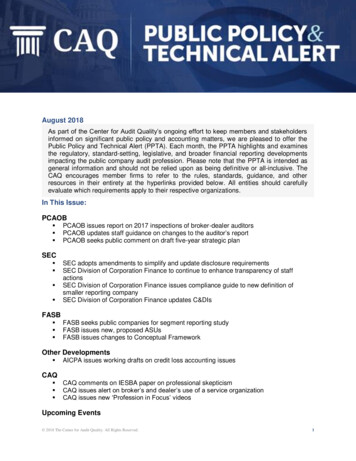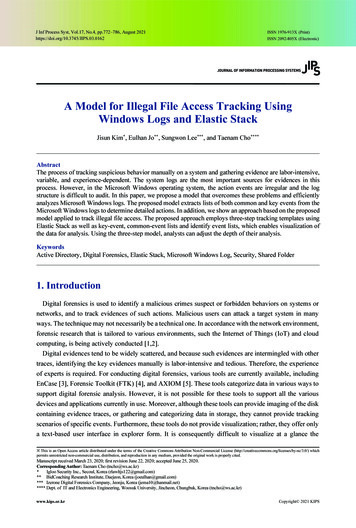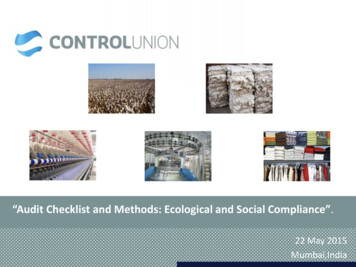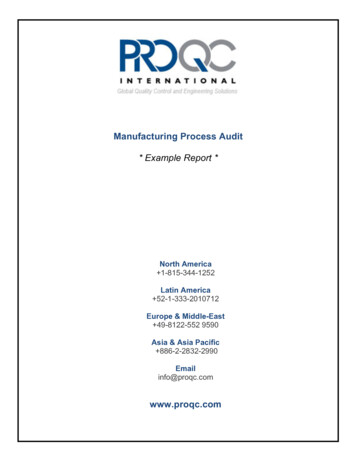
Transcription
August 2018As part of the Center for Audit Quality’s ongoing effort to keep members and stakeholdersinformed on significant public policy and accounting matters, we are pleased to offer thePublic Policy and Technical Alert (PPTA). Each month, the PPTA highlights and examinesthe regulatory, standard-setting, legislative, and broader financial reporting developmentsimpacting the public company audit profession. Please note that the PPTA is intended asgeneral information and should not be relied upon as being definitive or all-inclusive. TheCAQ encourages member firms to refer to the rules, standards, guidance, and otherresources in their entirety at the hyperlinks provided below. All entities should carefullyevaluate which requirements apply to their respective organizations.In This Issue:PCAOB PCAOB issues report on 2017 inspections of broker-dealer auditorsPCAOB updates staff guidance on changes to the auditor’s reportPCAOB seeks public comment on draft five-year strategic planSEC SEC adopts amendments to simplify and update disclosure requirementsSEC Division of Corporation Finance to continue to enhance transparency of staffactionsSEC Division of Corporation Finance issues compliance guide to new definition ofsmaller reporting companySEC Division of Corporation Finance updates C&DIsFASB FASB seeks public companies for segment reporting studyFASB issues new, proposed ASUsFASB issues changes to Conceptual FrameworkOther Developments AICPA issues working drafts on credit loss accounting issuesCAQ CAQ comments on IESBA paper on professional skepticismCAQ issues alert on broker’s and dealer’s use of a service organizationCAQ issues new ‘Profession in Focus’ videosUpcoming Events 2018 The Center for Audit Quality. All Rights Reserved.1
PCAOBPCAOB issues report on 2017 inspections of broker-dealer auditorsThe PCAOB on August 20 issued its Annual Report on the Interim Inspection Program Relatedto Audits of Brokers and Dealers (Annual Report). Consistent with prior years, and as noted in aCAQ alert, audit and attestation deficiencies were identified in the following areas: auditingrevenue, assessing and responding to risks of material misstatement due to fraud, auditingsupplemental information for the customer protection rule, engagement quality review, andexamination procedures. However, there were fewer independence violations identified than inprevious years.New this year, the PCAOB also issued Executive Highlights of the Annual Report. The ExecutiveHighlights provide a summary of actions for audit firms, the 2017 inspection results, and other keytakeaways. It also provides considerations for broker and dealer owners and audit committees(or equivalent), which may help foster a dialogue between the auditor and audit committee (orequivalent) on the actions being taken to avoid these types of deficiencies.PCAOB updates staff guidance on changes to the auditor’s reportThe PCAOB on August 23 published updated staff guidance on changes to the auditor’s report.The document includes a one-page summary of the updates made to the guidance from theprevious version issued on December 28, 2017.PCAOB seeks public comment on draft five-year strategic planThe PCAOB on August 10 released a draft of its five-year strategic plan, for the first time invitingpublic comment on its areas of strategic focus in fulfilling its mission to protect investors and thepublic interest through high quality audit reports. The Draft Strategic Plan 2018-2022 includes adraft of the PCAOB’s mission, vision, values, strategic goals and objectives, as well as key factorsaffecting the strategic outlook.The draft includes five strategic goals: Drive improvement in the quality of audit services through a combination of prevention,detection, deterrence, and remediation;Anticipate and respond to the changing environment, including emerging technologies andrelated risks and opportunities;Enhance transparency and accessibility through proactive stakeholder engagement; 2018 The Center for Audit Quality. All Rights Reserved.2
Pursue operational excellence through efficient and effective use of resources,information, and technology; and,Develop, empower, and reward staff, to achieve shared goals.The deadline for submitting comments is September 10, 2018.SECSEC adopts amendments to simplify and update disclosure requirementsThe SEC on August 17 voted to adopt amendments to certain disclosure requirements that havebecome duplicative, overlapping, or outdated in light of other SEC disclosure requirements, USGAAP, or changes in the information environment. The SEC is also referring certain disclosurerequirements that overlap with, but require information incremental to, US GAAP to the FASB forconsideration for potential incorporation into US GAAP.The amendments apply primarily to public reporting companies (including foreign private issuers).Some of the amendments also apply to other entities the SEC regulates, including Regulation Aissuers, investment advisers, investment companies, broker-dealers, and nationally recognizedstatistical rating organizations.The amendments are part of an initiative by the SEC’s Division of Corporation Finance (Corp Fin)to review disclosure requirements applicable to issuers to consider ways to improve therequirements for the benefit of investors and issuers. The amendments are also part of the SEC’sefforts to implement the Fixing America’s Surface Transportation Act, which, among other things,requires the SEC to eliminate provisions of Regulation S-K that are duplicative, overlapping,outdated, or unnecessary.The amendments will be effective 30 days from publication in the Federal Register.SEC Division of Corporation Finance to continue to enhance transparency of staffactionsCorp Fin in June announced that it would begin releasing via EDGAR documentation of certainstaff communications sent to issuers engaged in its filing review process. On August 20, Corp Finannounced that, starting October 1, 2018, it will begin to release via EDGAR orders it issuesgranting or denying regulatory relief on behalf of the SEC. Corp Fin said it intends to continue itsefforts to enhance transparency in subsequent phases by releasing additional types ofdocuments, including those memorializing actions or positions taken by Corp Fin staff, such asinterpretive guidance and no-action relief. 2018 The Center for Audit Quality. All Rights Reserved.3
SEC Division of Corporation Finance issues compliance guide to new definition ofsmaller reporting companyCorp Fin on August 10 issued A Small Entity Compliance Guide for Issuers, which summarizesthe SEC’s amendments to the definition of “smaller reporting company” (SRC) and relatedamendments. The guide is divided into the following sections: Summary of amendmentsQualifying as a SRCGuidance on transitioning to the amended SRC definitionChart of scaled disclosure requirements available to SRCsAmendments to Rule 3-05 of Regulation S-XAmendments to the accelerated filer and large accelerated filer definitionsOther resourcesContacting the SEC staffSEC Division of Corporation Finance updates C&DIsCorp Fin updated the following Compliance and Disclosure Interpretations (C&DIs): Proxy Rules and Schedules 14A/14Co New Questions 126.06 and 126.07 (Updated 7/31/18)FASBFASB seeks public companies for segment reporting studyThe FASB on August 6 announced that it is seeking public companies to participate in a study onpotential improvements to the segment aggregation guidance and the reportable segmentsprocess. The study is the first phase of preparer outreach to be conducted by the FASB onsegment reporting.For the study, the FASB seeks public companies that prepare financial statements using theaggregation criteria in FASB Accounting Standards Codification Topic 280, Segment Reporting.Participants in the study will be asked to provide information on how they currently use the criteriaand how two potential alternative approaches would affect their segment reporting.The study period began in August 2018 and is expected to last 2-3 months. Organizationsinterested in participating can register here. 2018 The Center for Audit Quality. All Rights Reserved.4
FASB issues new, proposed ASUsThe FASB issued four new Accounting Standards Updates (ASUs) in August: ASU 2018-12, Financial Services – Insurance (Topic 944): Targeted Improvements to theAccounting for Long-Duration ContractsIssued on August 15, the ASU improves financial reporting for insurance companies thatissue long-duration contracts, such as life insurance, disability income, long-term care,and annuities. Specifically, the ASU:oooooRequires updated assumptions for liability measurement;Standardizes the liability discount rate;Provides greater consistency in measurement of market risk benefits;Simplifies amortization of deferred acquisition costs; and,Requires enhanced disclosures.For calendar-year end public companies, the changes will be effective in 2021. For allother calendar-year end companies, the changes will be effective in 2022. Early adoptionis permitted.A FASB in Focus overview, an Understanding Costs and Benefits document, and aneducational video are also available. ASU 2018-13, Fair Value Measurement (Topic 820): Disclosure Framework – Changes tothe Disclosure Requirements for Fair Value MeasurementIssued on August 28, the ASU improves the disclosure requirements on fair valuemeasurements in Topic 820. The amendments are effective for all organizations for fiscalyears, and interim periods within those fiscal years, beginning after December 15, 2019.Early adoption is permitted. ASU 2018-14, Compensation – Retirement Benefits – Defined Benefit Plans – General(Topic 715-20): Disclosure Framework – Changes to the Disclosure Requirements forDefined Benefit PlansIssued on August 28, the ASU improves the disclosure requirements for employers thatsponsor defined benefit pension or other postretirement plans. The amendments areeffective for fiscal years ending after December 15, 2020, for public companies, and forfiscal years ending after December 15, 2021, for all other organizations. Early adoption ispermitted. 2018 The Center for Audit Quality. All Rights Reserved.5
ASU 2018-15, Intangibles – Goodwill and Other – Internal-Use Software (Subtopic 35040): Customer’s Accounting for Implementation Costs Incurred in a Cloud ComputingArrangement That Is a Service ContractIssued on August 29, the ASU aligns the following requirements for capitalizingimplementation costs:ooThose incurred in a hosting arrangement that is a service contract; and,Those incurred to develop or obtain internal-use software (and hostingarrangements that include an internal-use software license).The ASU is effective for public business entities for fiscal years beginning after December15, 2019, and interim periods within those fiscal years. For all other entities, the ASU iseffective for annual reporting periods beginning after December 15, 2020, and interimperiods within annual periods beginning after December 15, 2021. Early adoption ispermitted, including adoption in any interim period, for all entities. The ASU should beapplied either retrospectively or prospectively to all implementation costs incurred afterthe date of adoption.The FASB also issued two proposed ASUs: Proposed ASU, Leases (Topic 842): Narrow-Scope Improvements for LessorsIssued on August 13, the proposed ASU would reduce costs and ease implementation ofASU 2016-02, Leases (Topic 842) for financial statement preparers. The proposal wouldalso clarify a specific requirement in the standard related to lessor accounting. Specifically,the proposed ASU addresses the following issues facing lessors when applying theLeases standard:oooSales taxes and other similar taxes collected from lessees;Certain lessor costs paid directly by lessees; and,Recognition of variable payments for contracts with lease and non-leasecomponents.The deadline for submitting comments is September 12, 2018. 2018 The Center for Audit Quality. All Rights Reserved.6
Proposed ASU, Codification Improvements to Topic 326, Financial Statements – CreditLossesIssued on August 20, the proposed ASU would amend the transition requirements andscope of ASU 2016-13, Financial Instruments – Credit Losses (Topic 326): Measurementof Credit Losses on Financial Instruments. The proposed ASU would:oMitigate transition complexity by requiring entities other than public businessentities to implement it for fiscal years beginning after December 15, 2021,including interim periods within those fiscal years.oClarify that receivables arising from operating leases are not within the scope ofTopic 326, but rather, should be accounted for in accordance with Topic 842.The deadline for submitting comments is September 19, 2018.FASB issues changes to Conceptual FrameworkOn August 28, the FASB issued two changes to its Conceptual Framework: Statement of Financial Accounting Concepts No. 8, Conceptual Framework for FinancialReporting – Chapter 8, Notes to Financial StatementsThe new chapter explains what information the FASB should have preparers considerincluding in notes to financial statements by describing the purpose of notes, the natureof appropriate content, and general limitations. It also addresses the FASB’sconsiderations specific to interim reporting disclosure requirements. Amendments to Concepts Statement No. 8, Conceptual Framework for FinancialReporting – Chapter 3, Qualitative Characteristics of Useful Financial InformationThe amendments align the FASB’s definition of materiality with other definitions in thefinancial reporting system. The materiality concepts will now be consistent with the SEC’sdefinition of materiality, PCAOB and AICPA auditing standards, and the US judicialsystem. 2018 The Center for Audit Quality. All Rights Reserved.7
Other DevelopmentsAICPA issues working drafts on credit loss accounting issuesThe AICPA’s Financial Reporting Executive Committee on August 10 issued two working draftsof accounting issues related to implementation of Topic 326: Issue No. 1: Zero Expected Credit Losses Issue No. 22: Reversion Method: Estimation vs. Accounting PolicyThe deadline for submitting comments is October 10, 2018.CAQCAQ comments on IESBA paper on professional skepticismThe CAQ on August 15 submitted a comment letter on the International Ethics Standards Boardfor Accountants’ (IESBA) Consultation Paper, Professional Skepticism – Meeting PublicExpectations. Emphasizing the importance of professional skepticism and judgment to auditquality, the CAQ’s letter offers IESBA four high-level recommendations related to professionalskepticism: (1) create a better understanding of behavioral characteristics; (2) seek clarity andaddress ambiguity; (3) use collaboration to promote action; and (4) address the expectation gap.CAQ issues alert on broker’s and dealer’s use of a service organizationOn August 22, the CAQ issued Broker’s and Dealer’s Use of a Service Organization. The Alertincludes a decision tree and associated information designed to assist auditors of SEC-registeredbrokers and dealers in developing their audit approach on audit and attestation engagements ofa broker or dealer that uses a service organization.The CAQ notes that “[t]here is no one-size-fits-all approach to auditing a broker’s or dealer’s useof a service organization. Auditors should carefully design and execute their audit approach basedupon their understanding of the broker’s or dealer’s transactions, related risks, the relevantcontrols at the broker or dealer, and the controls performed at the service organization that arepart of the broker’s or dealer’s information system.”CAQ issues new ‘Profession in Focus’ videosIn August, the CAQ issued two new episodes of its online video series, Profession in Focus: 2018 The Center for Audit Quality. All Rights Reserved.8
Episode 60 features Jackie Daylor, National Managing Partner – Audit Quality &Professional Practice at KPMG in the U.S. She discusses the updated auditor’s report,critical audit matters, and the keys to success for audit committees and others as theycontend with a new approach to auditor reporting. Episode 61 features Jan Babiak, who serves on the boards of Walgreens Boots Alliance,Inc., Bank of Montreal, and Euromoney Institutional Investors. She offers insights on thebenefits of enhancing audit committee disclosure, the new auditor’s reporting model, auditcommittee “scope creep,” and how to think about board diversity.Upcoming EventsSeptember 12NACD Event: Data Privacy& Protection: The Board’sRole, Bethesda, MD (Link)September 19PCAOB Forum forAuditors of BrokerDealers, Fairfax, VA (Link)September 13SEC Investor AdvisoryCommittee Meeting,Washington, DC (Link)September 2117th Annual SEC ‘HotTopics’ Conference, Irvine,CA (Link)September 17-19AICPA NationalConference on Banks &Savings Institutions,National Harbor, MD (Link)September 24-25PLI SEC Reporting &FASB Forum for Mid-sized& Smaller Companies, LasVegas, NV (Link)September 17-21IASB Board Meeting,London, UK (Link)September 27-2823rd Symposium on AuditResearch, Champaign, IL(Link)September 18PCAOB Forum on Auditingin the Small BusinessEnvironment, Fairfax, VA(Link) 2018 The Center for Audit Quality. All Rights Reserved.September 29-October 2NACD 2018 Global BoardLeaders’ Summit,Washington, DC (Link)October 1-2SIFMA Annual Meeting,Washington, DC (Link)October 172018 Audit CommitteeSummit Program, NewportBeach, CA (Link)October 18PCAOB Forum on Auditingin the Small BusinessEnvironment, Tempe, AZ(Link)October 22ICGN New York Event,New York, NY (Link)October 22-24AICPA Conference onCredit Unions, Las Vegas,NV (Link)October 22-26IASB Board Meeting,London, UK (Link)9
November 2PCAOB Forum forAuditors of BrokerDealers, Jersey City, NJ(Link)November 8NACD-USC MarshallCorporate DirectorsSymposium, Los Angeles,CA (Link)November 12-13FEI Current FinancialReporting IssuesConference, New York,NY (Link) 2018 The Center for Audit Quality. All Rights Reserved.November 11-13AICPA Oil & GasConference, Denver, CO(Link)December 3-4PLI Annual SEC Reporting& FASB Forum, SanFrancisco, CA (Link)November 12-13PLI Annual SEC Reporting& FASB Forum, Dallas, TX(Link)December 10-12AICPA Conference onCurrent SEC and PCAOBDevelopments,Washington, DC (Link)November 12-16IASB Board Meeting,London, UK (Link)November 28-29PCAOB Standing AdvisoryGroup Meeting,Washington, DC (Link)December 10-14IASB Board Meeting,London, UK (Link)December 17-18PLI Annual SEC Reporting& FASB Forum, New York,NY and Webcast (Link)10
The Center for Audit Quality is an autonomous, nonpartisan, nonprofit organization dedicatedto enhancing investor confidence and public trust in the global capital markets by fosteringhigh-quality public company audits; collaborating with other stakeholders to advance thediscussion of critical issues; and advocating policies and standards that promote publiccompany auditors’ objectivity, effectiveness and responsiveness to dynamic marketconditions. Based in Washington, D.C., the CAQ is affiliated with the American Institute ofCPAs. For more information, visit www.thecaq.org.The CAQ Public Policy and Technical Alert (PPTA) is intended as general information andshould not be relied upon as being definitive or all-inclusive. As with all other CAQ resources,this is not authoritative and readers are urged to refer to relevant rules and standards. If legaladvice or other expert assistance is required, the services of a competent professional shouldbe sought. The CAQ makes no representations, warranties, or guarantees about, andassumes no responsibility for, the content or application of the material contained herein andexpressly disclaims all liability for any damages arising out of the use of, reference to, orreliance on such material. This publication does not represent an official position of the CAQ,its board or its members.Questions and comments about the PPTA can be addressed to: aschumacher@thecaq.org. 2018 The Center for Audit Quality. All Rights Reserved.11
AICPA issues working drafts on credit loss accounting issues CAQ CAQ comments on IESBA paper on professional skepticism CAQ issues alert on broker's and dealer's use of a service organization CAQ issues new 'Profession in Focus' videos Upcoming Events











